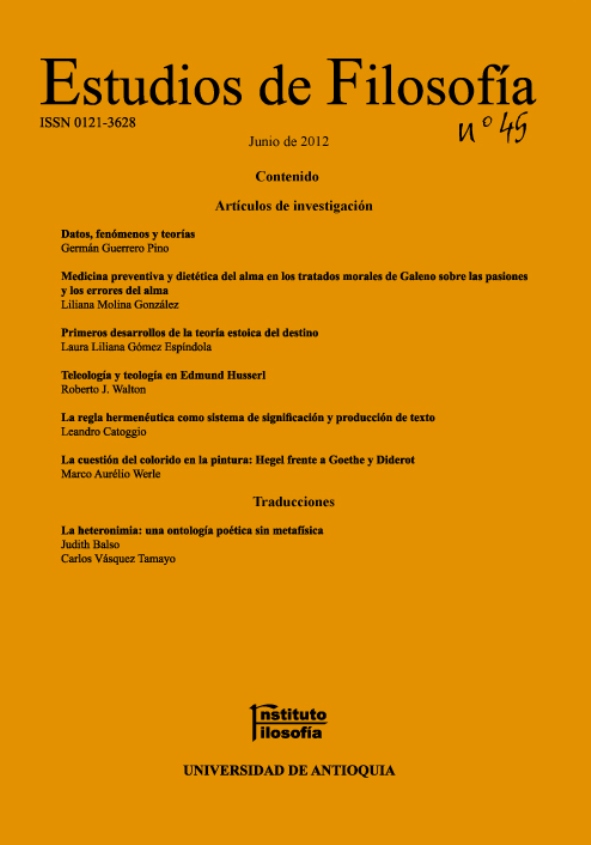First developments of the stoic theory of fate
DOI:
https://doi.org/10.17533/udea.ef.13477Keywords:
Ancient Stoicism, Fate, Fatalism, Divine Reason.Abstract
The goal of this article is to clarify the first developments of Zeno, Cleanthes and Chrysippus’ Theory of Fate. In the course of the argumentation it will be clear that all of them considered Fate as identical to Divine Reason, the active principle of Nature responsible for moving and qualifying matter. On those grounds it will be argued, on the one hand, that they held that Fate is part of the intrinsic nature of the world and, on the other hand, that Fate has a universal scope, since all the movements and the qualitative states of the world, even in their smallest details, are produced by Divine Reason. Finally it will be shown that, according to the first developments of the three heads of the school, Fate has a fatalistic mechanism in the production of human life’s events.
Downloads
References
ARNIM, H. F. A. V. (1903) Stoicorum veterum fragmenta collegit Ioannes ab Arnim. Lipsiae: aedibus B. G. Teubneri.
BOBZIEN, S. (1998). Determinism and Freedom in Stoic Philosophy. Oxford: OUP.
BOTROS, S. (1985) “Freedom, Causality, Fatalism and Early Stoic Philosophy”, en: Phronesis, 30, 274-304. DOI: https://doi.org/10.1163/156852885X00101
CALCIDIO. (1962) “Platonis Timaeus translatus commentarioque instructus”, en: J. H. Waszink (Ed.). Londres: Leiden.
CICERÓN (1984). “De natura deorum”, en: Samaranch (Ed.). Sobre la naturaleza de los dioses. Madrid: Sarpe.
CICERÓN (2005) “De Fato”, en: J. Pimentel (Ed.). Del Hado. México: Bibliotheca scriptorum graecorum et romanorum mexicana.
EPÍCTETO (1928a). “Dissertationes ab Arriano digestae”, en: W. A. Old father (Ed.). Discourses. Londres: Loeb Classical Library.
EPÍCTETO (1928b) “Enchiridion”, en: W. A. Oldfather (Ed.). Enchereidon. Londres: Loeb Classical Library. DOI: https://doi.org/10.4159/DLCL.epictetus-encheiridion.1928
EUSEBIO (1954-1956) “Preparatio evangelica”, En: e. K. Mras (Ed.). Berlin: Akademie Verlag.
FILÓN (1896) "Legum allegoriarum libri i-iii.", en: L. Cohn (Ed.). Philonis Alexandrini opera quae supersunt vol. 1. Berlin: Reimer.
GALENO (1821) “Introductio sive medicus”, en: C. G. Kühn (Ed.). Claudii Galeni opera omnia (Vol. 14). Leipzig: Knobloch.
GOULD, J. (1974) “The Stoic Conception of Fate”, en: Journal of the History of Ideas, 35, 17-32. DOI: https://doi.org/10.2307/2708740
LAERCIO, D. (1925) “Vitae philosophorum”, en: R. D. Hicks (Ed.). Lifes of eminent philosophers. Londres: Loeb Classical Library.
LONG, A. (1971) “Freedom and Determinism in the Stoic Theory of Human Action”, en: A. Long (Ed.). Problems in Stoicism. Londres: Athlone Press.
LONG, A. A., & Sedley, D. N. (1987) The Hellenistic philosophers. Cambridge [Cambridgeshire]; New York: Cambridge University Press. DOI: https://doi.org/10.1017/CBO9781139165907
LIEDL, H. G., SCOTT, R., JONES, H. S., & McKENZIE, R. (1996) A Greek- English lexicon (Rev. y aum. ed.). Oxford New York: Clarendon Press; Oxford University Press.
PLUTARCO (1959) “De Stoicorum repugnantiis”, en: R. W. y. M. Pohlenz. (Ed.). Plutarchi moralia (2 ed., Vol. 6). Leipzig: Teubner.
SHARPLES, R.W. (1986) “Soft determinism and freedom in early Stoicism”, en: Phronesis, 31, 266-279. DOI: https://doi.org/10.1163/156852886X00164
Downloads
Published
How to Cite
Issue
Section
Categories
License
Copyright (c) 2012 Laura Liliana Gómez Espíndola

This work is licensed under a Creative Commons Attribution-NonCommercial-ShareAlike 4.0 International License.
Authors who publish with this journal agree to the following terms:
1. The Author retains copyright in the Work, where the term "Work" shall include all digital objects that may result in subsequent electronic publication or distribution.
2. Upon acceptance of the Work, the author shall grant to the Publisher the right of first publication of the Work.
3. The Author shall grant to the Publisher a nonexclusive perpetual right and license to publish, archive, and make accessible the Work in whole or in part in all forms of media now or hereafter known under a Creative Commons Attribution-NoCommercia-ShareAlike (CC BY-NC-SA 4.0), or its equivalent, which, for the avoidance of doubt, allows others to copy, distribute, and transmit the Work under the following conditions: (a) Attribution: Other users must attribute the Work in the manner specified by the author as indicated on the journal Web site;(b) Noncommercial: Other users (including Publisher) may not use this Work for commercial purposes;
4. The Author is able to enter into separate, additional contractual arrangements for the nonexclusive distribution of the journal's published version of the Work (e.g., post it to an institutional repository or publish it in a book), as long as there is provided in the document an acknowledgement of its initial publication in this journal;
5. Authors are permitted, and Estudios de Filosofía promotes, to post online the preprint manuscript of the Work in institutional repositories or on their Websites prior to and during the submission process, as it can lead to productive exchanges, as well as earlier and greater citation of published work (see The Effect of Open Access). Any such posting made before acceptance and publication of the Work is expected be updated upon publication to include a reference to the Estudios de Filosofía's assigned URL to the Article and its final published version in Estudios de Filosofía.















